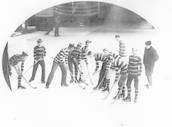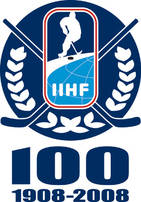Structured ice hockey originated in the mid-1800s in the eastern parts of Canada. James G. Creighton, from Nova Scotia, is generally credited with having taken the so called "Halifax-rules" to Montreal in the 1870s where they eventually were altered to the "McGill-rules". Creighton was instrumental in organising what today is considered as the first organized game of hockey.
On March 3, 1875, captain Creighton's McGill defeated captain Fred Torrence's Victoria team 2 "games" (i.e. goals) to 1. It was the first known game which was pre-announced, where two named teams played on a confined ice area (a rink), where all names of the players were recorded as well as the score and the game was played with "a flat circular piece of wood", a puck. The game was played at the Victoria Skating Rink in Montreal.
Two years later, on January 31, 1877, the McGill University in Montreal formed the first organised hockey team and on February 27, the Montreal Gazette published the first hockey rules - seven in all.
The first ice hockey games in Europe were played at the Prince's Skating Club in Knightsbridge, England, in 1902. In 1905, Belgium and France played two international games on March 4. Three years later, the LIHG (later the IIHF) was founded in Paris, France.
The Society for International Hockey Research (SIHR) has the following definition for ice hockey: Hockey is a game played on an ice rink in which two opposing teams of skaters, using curved sticks, trying to drive a small disc into or through the opposing goals.












